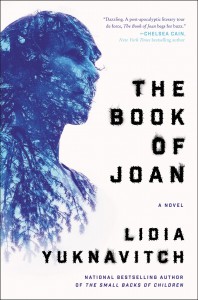Review: The Book of Joan

The Book of Joan starts off as one of the most prophetic, imaginative, and thought-provoking novels of the social media era. It ends far away, a genre-bending, weird thriller that at least remains thought provoking. Throughout it all, the language is rich and the story is compelling. Although the incongruous final acts managed to alienate me as a reader, I was pulled in for so much of the story and enjoyed the experience.
A reimagining of sorts of Joan of Arc, The Book of Joan is a dystopian tale of what happens when a madman becomes the world's most powerful leader. As decisions to plunder the world for a profit turn disastrous, the earth chooses a hero, Joan. Really, does this future seem so far fetched? And do these characters' reflections on the dictator Jean de Men sound the least bit foreign?
...he overtook lives, his performances increasingly more violent in form. His is a journey from opportunistic showman, to worshiped celebrity, to billionaire, to fascistic power monger. What was left? When the Wars broke out, his transformation to sadistic military leader came as no surprise.
We are what happens when the seemingly unthinkable celebrity rises to power.
And again:
If we look at history—those of us who study it, who can remember it—we understand the reason why those who come to power swiftly, amid extreme national crises, are so dangerous: during such crises, we all turn into children aching for a good father. And the truth is, in our fear and despair, we'll take any father. Even if his furor is dangerous. It's as if humans can't understand how to function without a father. Perhaps especially then, we mistake heroic agency for its dark other.
In the first two parts of the novel, this is the story we get. It is a constant condemnation of many things, including commonly held notions of power, sexuality, and art, all told in vividly stunning passages. In this future, humans have begun a process of de-evolution. As humanity veers toward extinction, many of the remaining asexual population have become hypersexualized. They seek to recreate themselves through intricate grafts. Through two-thirds of this novel, the story is language driven, and characters and plot are merely devices to give body to the words. This is the creation story in reverse as told through the intricate weaving of words.
In the final part of The Book of Joan, the story got a bit messy for me, as I'm sure it will with many readers not so accustomed to hard sci-fi. The action is turned up and the threads become so knotted with one another and with techno-babble that it's difficult to discern what is going on. Add to that the final scenes, where oddity becomes normality and a particular plot device I've never been a fan of makes an appearance.
What would've been a solid review for this novel was hurt some by this conclusion. What drew me into this book originally was the nearness of the events and the construction of language, but as everything drifted from what was familiar, I myself became untethered. And though I recognize that the story ends with the same strong commentary on power, sexuality, and art that it began with, it was a commentary addressed to a much different audience.

 3
3



